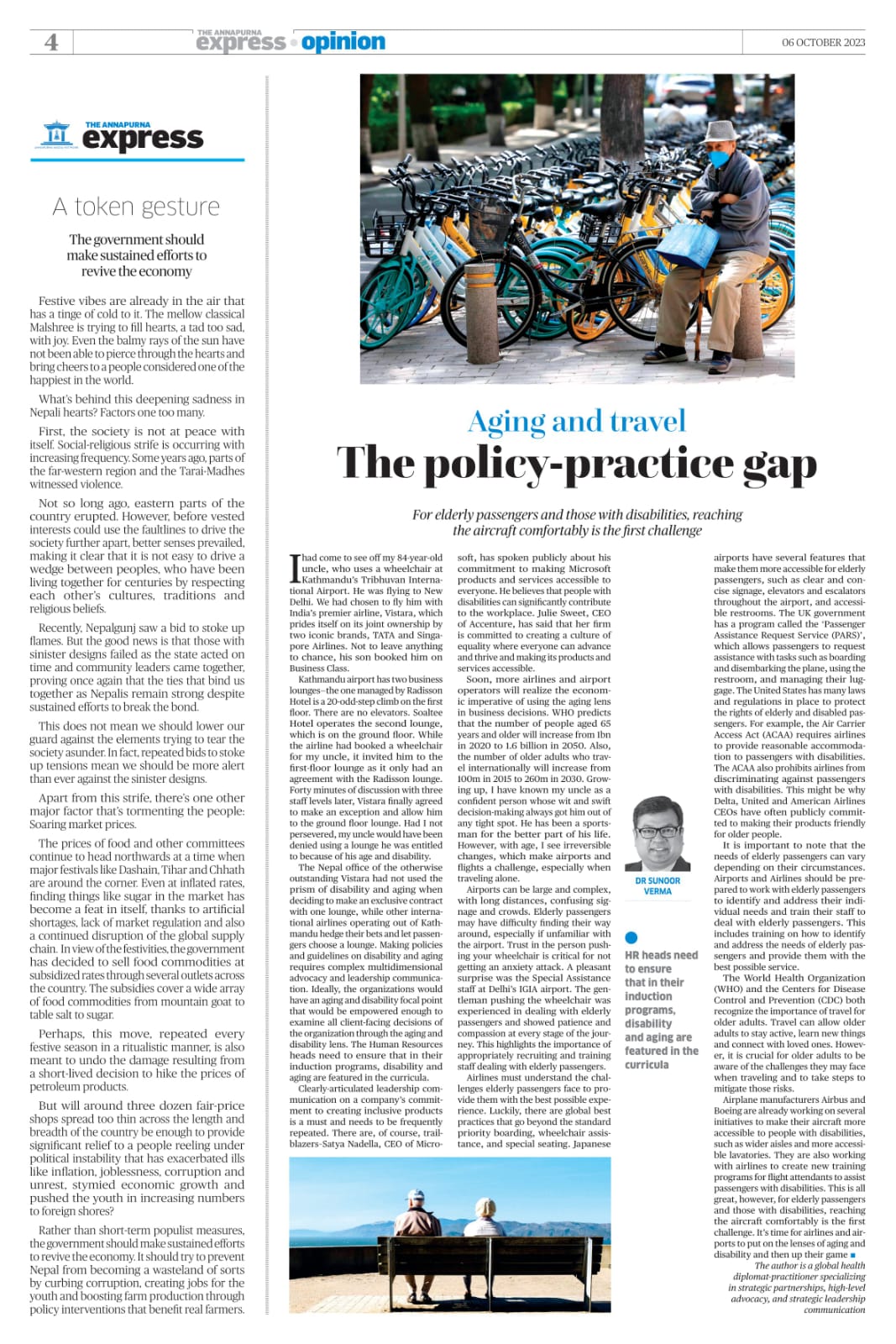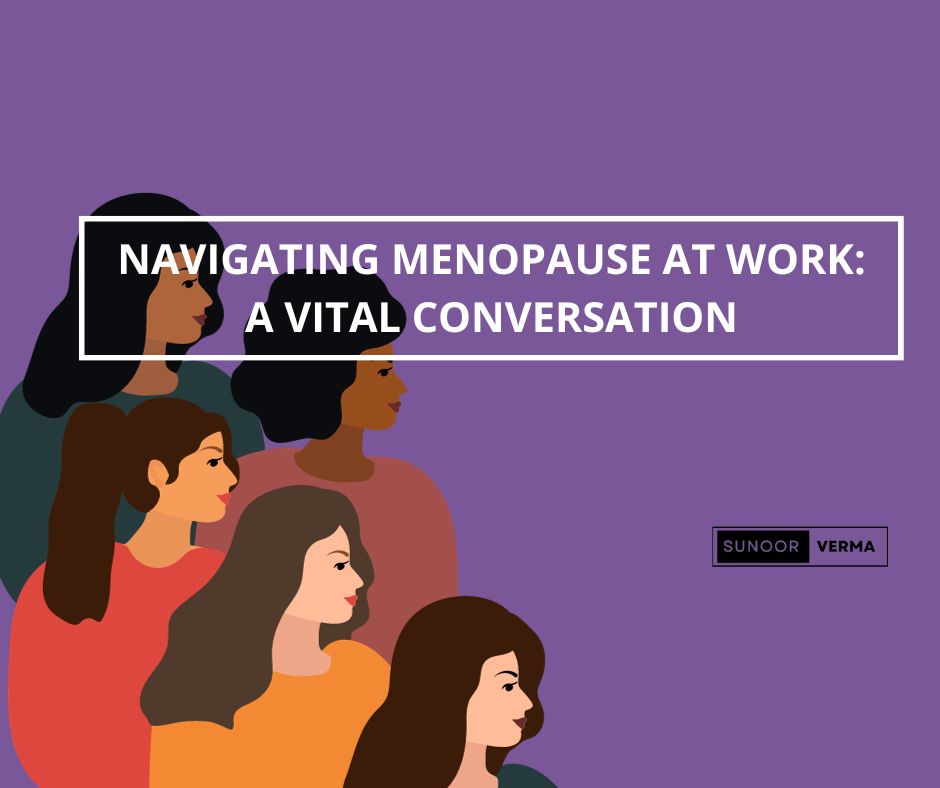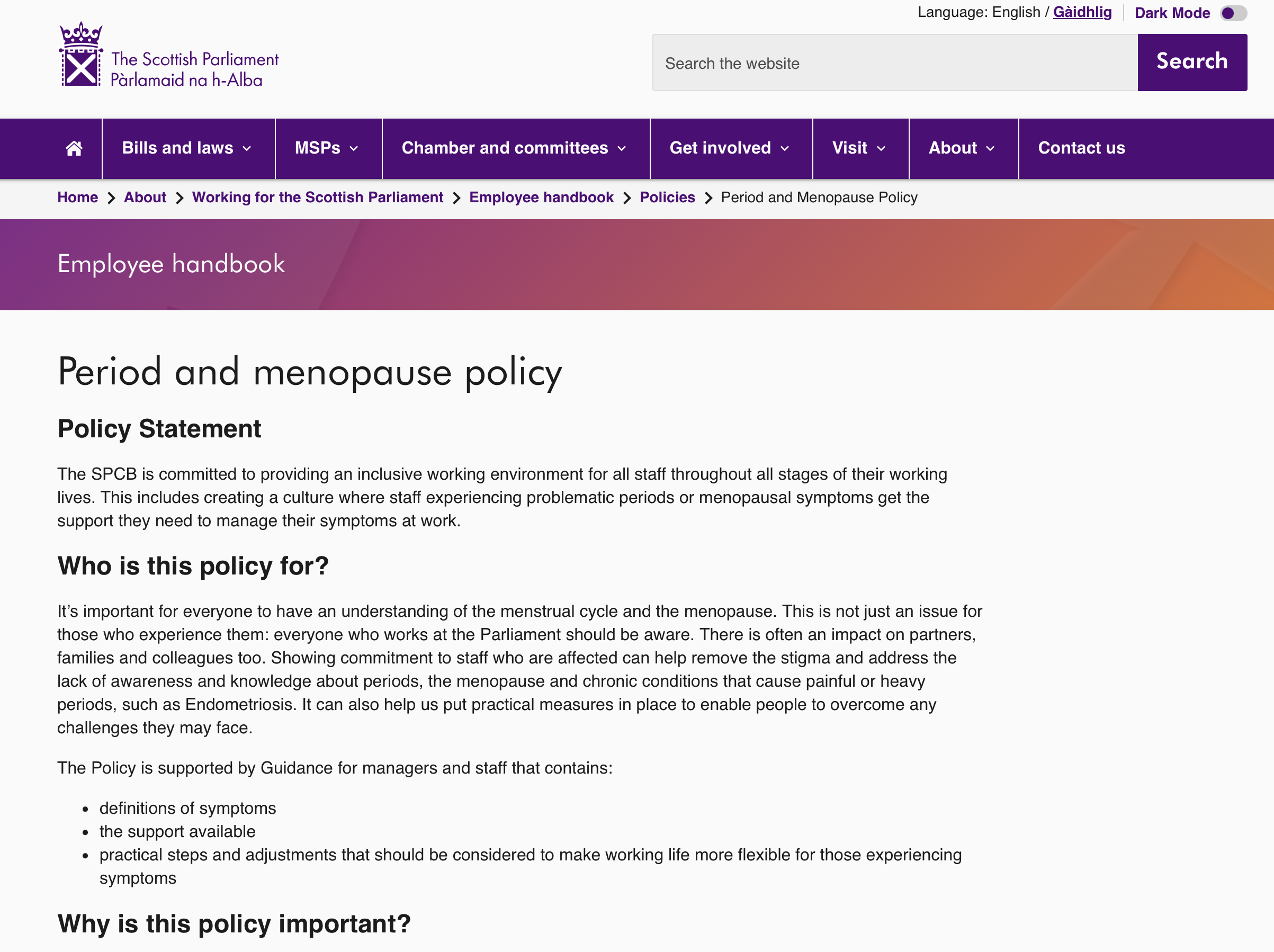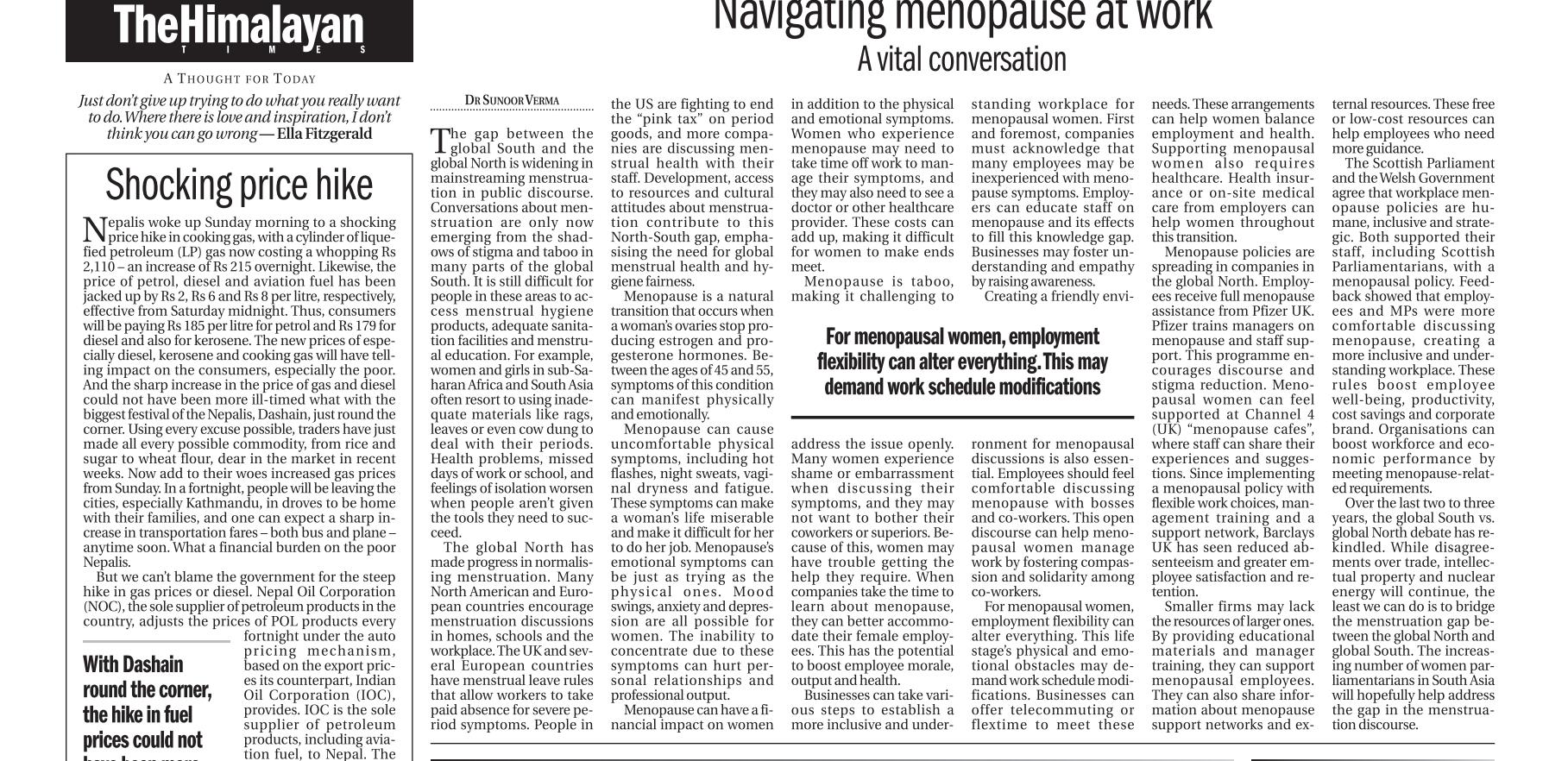
I had come to see off my eighty-four-year-old uncle, who uses a wheelchair at Kathmandu’s Tribhuvan International Airport. He was flying to New Delhi. We had chosen to fly him with India’s premier airline, Vistara, which prides itself on its joint ownership by two iconic brands, TATA and Singapore Airlines. Not to leave anything to chance, his son booked him on Business Class.
Kathmandu airport has two business lounges – the one managed by Radisson Hotel is a twenty-odd-step climb on the first floor. There are no elevators. Soltee Hotel operates the second lounge, which is on the ground floor. While the airline had booked a wheelchair for my uncle, it invited him to the first-floor lounge as it only had an agreement with the Radisson lounge. Forty minutes of discussion with three staff levels later, Visatara finally agreed to make an exception and allow him to the ground floor lounge. Had I not persevered, my uncle would have been denied using a lounge he was entitled to because of his #age and #disability.
The Nepal office of the otherwise outstanding Vistara had not used the prism of disability and ageing when deciding to make an exclusive contract with one lounge, while other international airlines operating out of Kathmandu hedge their bets and let passengers choose a lounge.
Making policies and guidelines on disability and #ageing requires complex-multidimensional #advocacy and leadership communication. Ideally, the organizations would have an ageing and #disability focal point that would be empowered enough to examine all client-facing decisions of the organization through the ageing and disability lens. The Human Resources heads need to ensure that in their induction programs, disability and ageing are featured in the curricula.
Clearly articulated leadership communication on a company’s commitment to creating inclusive products is a must and needs to be frequently repeated. There are, of course, trailblazers- Satya Nadella, CEO of Microsoft, has spoken publicly about his commitment to making Microsoft products and services accessible to everyone. He believes that people with disabilities can significantly contribute to the workplace. Similarly, Julie Sweet, CEO of Accenture, has said that her firm is committed to creating a culture of equality where everyone can advance and thrive and making its products and services accessible.
Soon, more airlines and airport operators will realize the economic imperative of using the ageing lens in business decisions. WHO predicts that the number of people aged 65 years and older will increase from 1 billion in 2020 to 1.6 billion in 2050. Similarly, the number of older adults who travel internationally will increase from 100 million in 2015 to 260 million in 2030.
Growing up, I have known my uncle as a confident person whose wit and swift decision-making always got him out of any tight spot. He has been a sportsman for the better part of his life. However, with age, I see irreversible changes which make airports and flights a challenge, especially when travelling alone.
#Airports can be large and complex, with long distances, confusing signage, and crowds. Elderly passengers may have difficulty finding their way around, especially if unfamiliar with the airport. Trust in the person pushing your wheelchair is critical for not getting an anxiety attack. A pleasant surprise was the Special Assistance staff at Delhi’s IGIA airport. The gentleman pushing the wheelchair was experienced in dealing with elderly passengers and showed patience and compassion at every stage of the journey. This highlights the importance of appropriately recruiting and training staff dealing with elderly passengers.
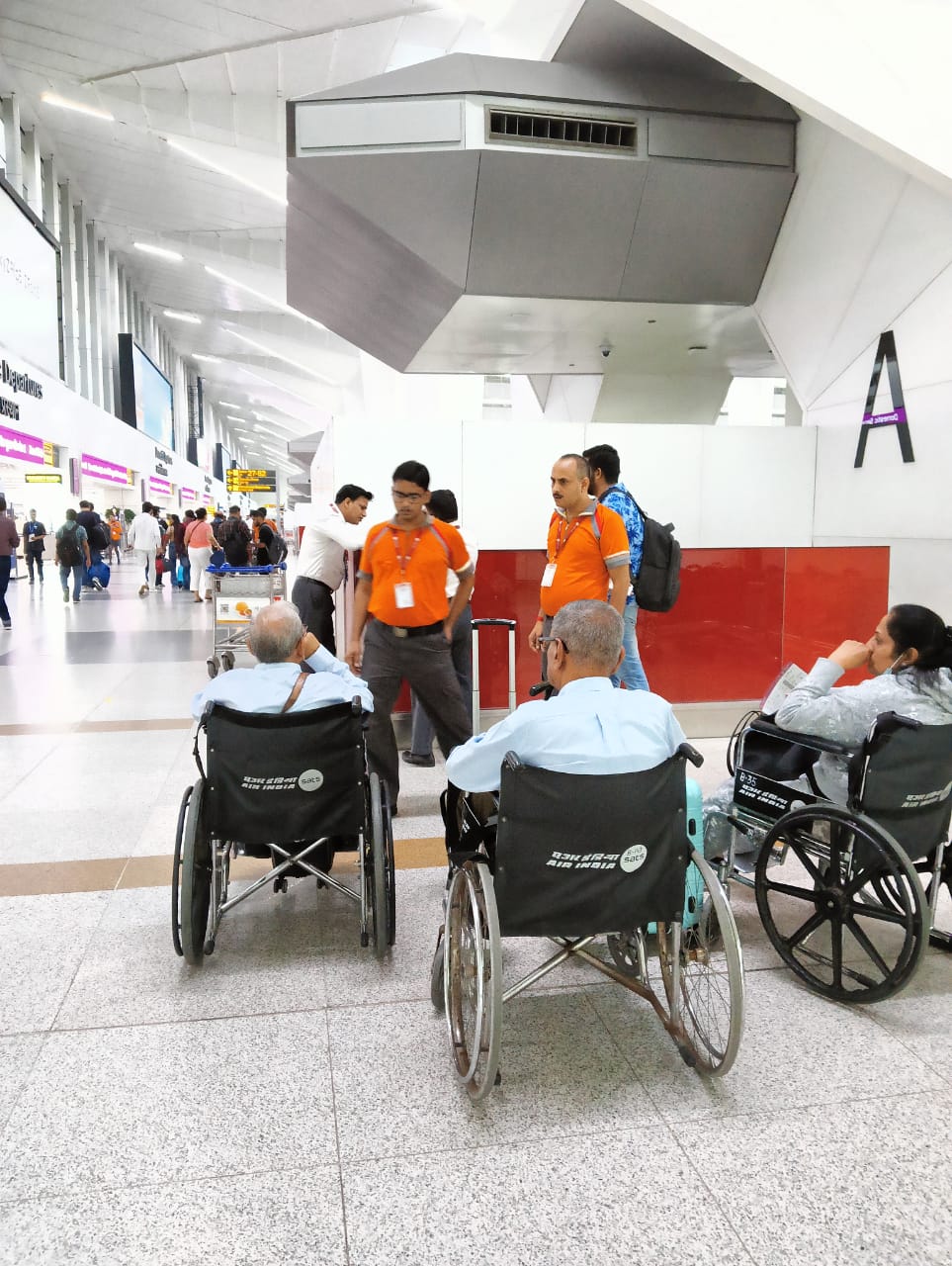
Airlines must understand the challenges elderly passengers face to provide them with the best possible experience. Luckily, there are global best practices that go beyond the standard priority boarding, wheelchair assistance, and special seating.
Japanese airports have several features that make them more accessible for elderly passengers, such as clear and concise signage, elevators and escalators throughout the airport, and accessible restrooms. The UK government has a program called the “Passenger Assistance Request Service” (PARS), which allows passengers to request assistance with tasks such as boarding and disembarking the plane, using the restroom, and managing their luggage. The United States has many laws and regulations in place to protect the rights of elderly and disabled passengers. For example, the Air Carrier Access Act (ACAA) requires airlines to provide reasonable accommodation to passengers with disabilities. The ACAA also prohibits airlines from discriminating against passengers with disabilities. This might be why Delta, United and American Airlines CEOs have often publicly committed to making their products friendly for older people.
More airlines and airport operators are starting to realize the economic benefits of considering the needs of older travelers in their business decisions. By 2050, the number of people aged 65 and older is predicted to reach 1.6 billion, with international travel expected to increase from 100 million in 2015 to 260 million in 2030. To provide the best possible experience for elderly passengers, airlines need to understand the unique challenges they face. Fortunately, there are global best practices available that go beyond standard accommodations. The World Health Organization and Centers for Disease Control and Prevention recognize the importance of travel for older adults, but it’s important for them to be aware of the potential risks and take necessary precautions.
It is important to note that the needs of elderly passengers can vary depending on their circumstances. Airports and Airlines should be prepared to work with elderly passengers to identify and address their individual needs and train their staff to deal with elderly passengers. This includes training on how to identify and address the needs of elderly passengers and provide them with the best possible service.
The World Health Organization (WHO) and the Centers for Disease Control and Prevention (CDC) both recognize the importance of travel for older adults. Travel can allow older adults to stay active, learn new things, and connect with loved ones. However, it is crucial for older adults to be aware of the challenges they may face when travelling and to take steps to mitigate those risks.
There are several things that older adults can do to prepare for travel, including:
-
-
Get a check-up from their doctor before travelling.
-
Make sure their vaccinations are up to date.
-
Get travel insurance.
-
Plan what to do if they get sick or injured while travelling.
-
-
-
Getting vaccinated against travel-related illnesses.
-
Practising good hygiene, such as washing their hands often and avoiding contact with sick people.
-
Eating and drinking safely.
-
Taking precautions to avoid mosquito bites.
-
It is also recommended that older adults plan what to do if they get sick while travelling. This plan should include:
-
-
Knowing where to go for medical care.
-
Having a list of important phone numbers, such as the number of their doctor and their travel insurance company.
-
Having a plan for how to get home if they need to be evacuated.
-
Aeroplane manufacturers Airbus and Boeing are already working on several initiatives to make their aircraft more accessible to people with disabilities, such as wider aisles and more accessible lavatories. They are also working with airlines to create new training programs for flight attendants to assist passengers with disabilities.This is all great; however, for elderly passengers and those with disabilities, reaching the aircraft comfortably is the first challenge. It’s time for #airlines and airports to put on the lenses of ageing and disability and then up their game.
Dr Sunoor Verma is a global health diplomat-practitioner specializing in strategic partnerships, high-level advocacy, and strategic leadership communication.
An abridged version of this article has been published in Nepal’s English language daily The Annapurna Express on 6 October 2023, page 4.
